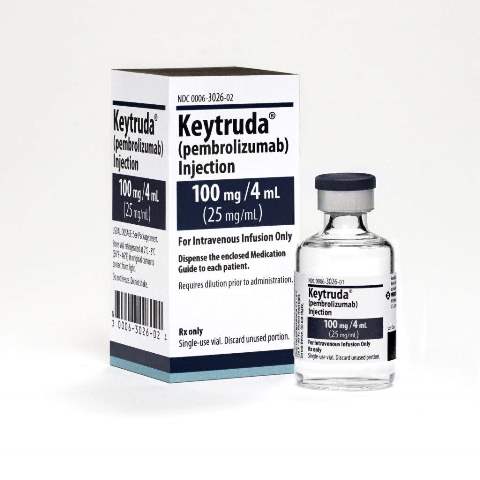Merck announced new and updated findings from the Phase 3 EORTC1325/KEYNOTE-054 trial evaluating KEYTRUDA, Merck’s anti-PD-1 therapy, as adjuvant therapy in resected, high-risk stage III melanoma.

Merck’s anti-PD-1 therapy Keytruda (Credit: Merck Sharp & Dohme Corp.)
Subscribe to our email newsletter
Late-breaking, first-time study results showed that with 3.5 years of follow-up, adjuvant KEYTRUDA met the key secondary endpoint of distant metastasis-free survival (DMFS), reducing the risk of distant metastasis or death by 40% versus placebo (HR=0.60 [95% CI, 0.49-0.73]; p<0.001), with 3.5-year DMFS rates of 65.3% and 49.4%, respectively. In addition, KEYTRUDA demonstrated a sustained recurrence-free survival (RFS) benefit versus placebo across stage IIIA (>1 mm lymph node metastasis), IIIB and IIIC melanoma, with 3.5-year RFS rates of 59.8% for KEYTRUDA versus 41.4% for placebo (HR = 0.59 [95% CI, 0.49-0.70]; p<0.001). The RFS and DMFS benefits were observed across key subgroups, including disease stages (both according to AJCC-7 and AJCC-8), BRAF mutation status and PD-L1 expression.
“Despite surgical intervention, patients diagnosed with high-risk stage III melanoma can experience disease recurrence, and for those with distant metastasis, they often face a significantly worse prognosis,” said Alexander Eggermont, study chair, Chief Scientific Officer Princess Máxima Center, Utrecht, Netherlands. “These new and updated data, including first-time results for distant metastasis-free survival are significant, showing that adjuvant KEYTRUDA not only delayed recurrence but also delayed distant metastasis, further reinforcing the benefits of KEYTRUDA for these patients with stage III melanoma.”
“In KEYNOTE-054, adjuvant treatment with KEYTRUDA also continued to demonstrate long-term improvements in the prevention of new disease compared to placebo, with nearly 60% of patients alive and recurrence-free after 3.5 years,” said Dr. Scot Ebbinghaus, vice president, clinical research, Merck Research Laboratories. “Taken together with the new distant metastasis-free survival results shown in this trial, these data point to the important role KEYTRUDA plays in melanoma in the adjuvant setting and are encouraging for the evaluation of KEYTRUDA in earlier disease states in other tumor types.”
These late-breaking data were presented as a proffered paper at the European Society for Medical Oncology (ESMO) Virtual Congress 2020 on Saturday, Sept. 19 (Abstract #LBA46). As announced, data spanning more than 15 types of cancer will be presented from Merck’s broad oncology portfolio and investigational pipeline at the congress. A compendium of presentations and posters of Merck-led studies is available here. Follow Merck on Twitter via @Merck and keep up to date with ESMO news and updates by using the hashtag #ESMO20.
KEYTRUDA is currently approved for the adjuvant treatment of patients with melanoma with involvement of lymph node(s) following complete resection in more than 70 countries based on the results from EORTC1325/KEYNOTE-054. Merck’s broad clinical development program in melanoma and skin cancers is addressing areas of unmet need by investigating KEYTRUDA in earlier stages of disease and in combination with other anti-cancer therapies across multiple potential registration-enabling studies, including KEYNOTE-716, LEAP-003 and LEAP-004.
 Advertise With UsAdvertise on our extensive network of industry websites and newsletters.
Advertise With UsAdvertise on our extensive network of industry websites and newsletters.
 Get the PBR newsletterSign up to our free email to get all the latest PBR
news.
Get the PBR newsletterSign up to our free email to get all the latest PBR
news.

